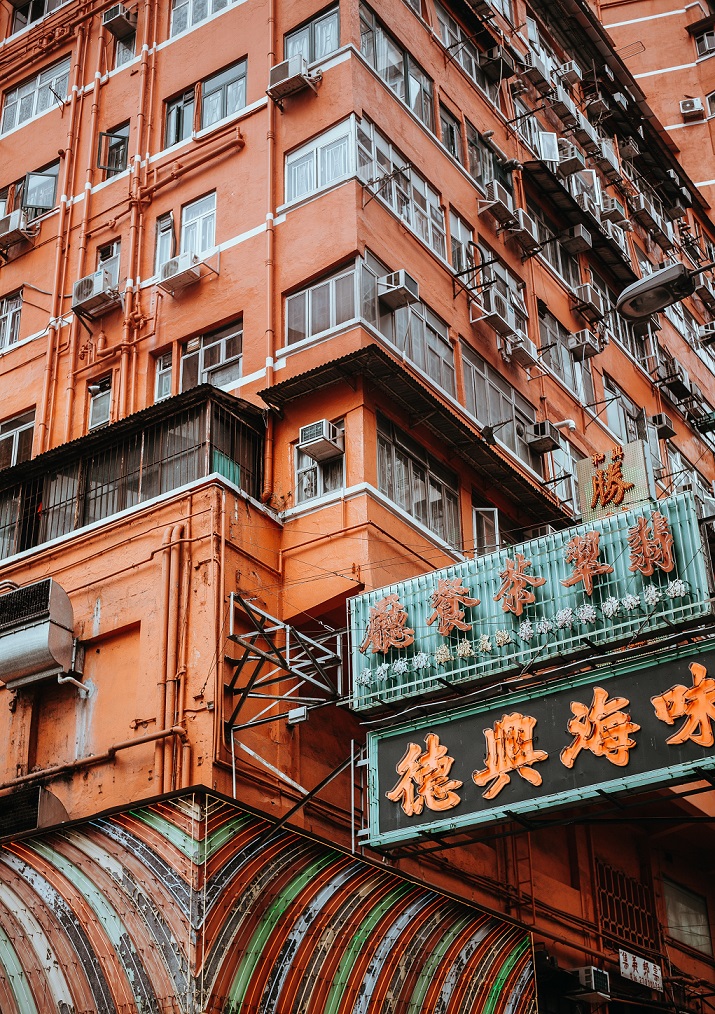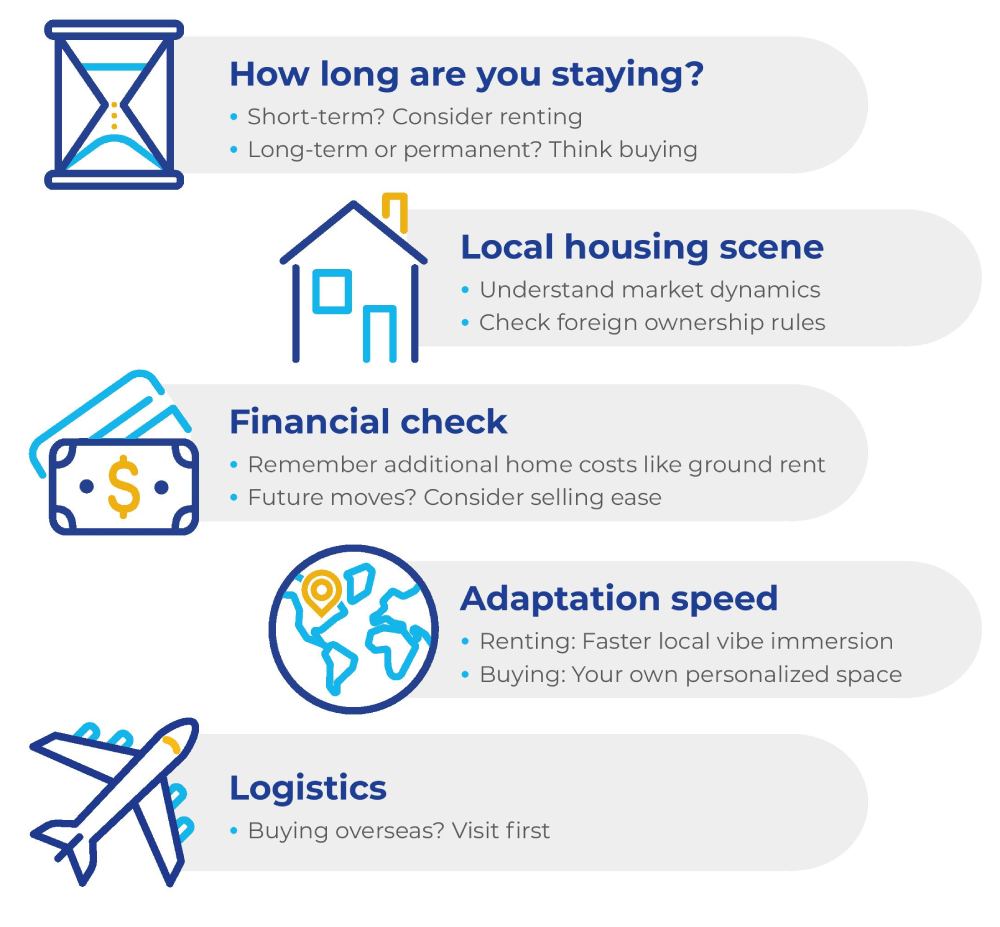
Are you moving overseas and not sure whether you want to rent or buy? Don’t worry, you’re not alone. This is a pivotal decision during any international relocation, and we’ve been helping people make the decision that works best for them and their family for decades.
Before delving into the specifics of each location in our series, it’s essential to understand the overarching factors that influence this decision, regardless of where in the world you’re headed.
We’ve prepared a list of questions and considerations that you should be asking yourself regardless of where you’re moving in the world. These should be the very first things you weigh up in your mind, before you make a decision about renting or buying in your new home. Remember too, that if you’re moving for work, much of this is contingent on what your assignment contract stipulates about living expenses (if any):
- Just a Pit Stop?: If you’re only setting up camp for a short while – for example, a short-term assignment or secondment, renting might be your best bet. After all, it has a lower up-front cost.
- Here for the Long Haul?: Is it a permanent move, or maybe your employer has booked it in as a long-term assignment? Maybe buying’s your game. Just remember, it’s a commitment.
- The Money Talk: Different places, different rules. Get the lowdown on local market dynamics. Is it a buyer’s market, or are you better off renting?
- Can You Even Buy Here?: Dive into the do’s and don’ts. Some countries have restrictions for foreign property owners.
- Upfront and Ongoing Costs: Owning isn’t just about the buying price. There are maintenance costs, taxes, and maybe homeowner association fees. Renting might be easier on the wallet, at least for now.
- Thinking of Another Move?: If there’s another potential move in your future, think about how fast you can sell and get your money out.
- Dive into the Deep End: Renting can be a quick way to get a feel for the local vibe, helping you adjust faster.
- Custom Space, Custom Pace: Owning means you get to shape your space. If leaving a personal touch is your thing, buying might be up your alley.
- Best of Both Worlds: Sometimes, it’s smart to complete your move and rent first. Get the lay of the land, then decide if buying’s the move. Plus, it’s a two-step approach to settling down.
- Buying from Afar: It’s doable to buy property overseas without visiting. But, like buying shoes without trying them on, there can be surprises. Do your research and if you can, maybe take a trip to see it first hand. Remember that “buying from afar” may involve a higher down payment and interest rate from the mortgage lender.
The Hong Kong Housing Market
Hong Kong consistently ranks among the world’s most expensive property markets. Several factors contribute to this:
- Limited Supply of Land: Geographical constraints mean that there’s limited usable land in Hong Kong. Much of the territory is hilly or mountainous, leaving a small percentage of land that can be developed. This scarcity drives up prices.
- High Demand: Hong Kong’s status as a global financial hub attracts a dense population of both locals and expatriates. The constant demand, coupled with limited supply, keeps property prices high.
- Government Policy: The Hong Kong government owns all the land and grants land leases for a specified period, typically 50 years or more. The government’s land sale policies, which determine how much land is released for development each year, can directly influence property prices.
Because of the exceptionally high cost of property in Hong Kong, it is exceptionally unusual for anyone, including families, to live in a house.
Apartments constitute the overwhelming majority of households, with a three-person family living, on average, in around 450 square feet.
Whether renting or buying, remember that, unless you are independently wealthy, you will likely be living in an apartment of some kind.

Current Trends
As of 2023, The Hong Kong property market is in a slight slump, with an expected decline in prices of 3% year-on-year for the whole of the year. This slight decline is attributable to the larger cool-off in the Chinese property market, with the collapse of major developers like Evergrande.
Despite this slump, the average cost of a home in Hong Kong remains enormous, at US $1.2 million according to the CBRE’s Global Living Report. There’s a significant standard deviation within this figure of course, as it is inflated by the large market for luxury property in the city. However, a 700 square foot apartment in the New Territories will still cost anywhere between US $600,000-800,000!
According to Numbeo, rental prices currently range from an average of about US $1,300 per month for a one-bedroom apartment outside of the center (Lantau Island, the New Territories and so on), to US $3,600 per month for a three-bedroom apartment nearer to the city center (Hong Kong Island, essentially).
When assessing rental cost versus purchase cost, renting is usually the more affordable option for most expatriates. Although it’s important to note the slump in the HK property market has been accompanied by a corresponding rise in rental prices.
Stamp Duty in Hong Kong
The Government of the Hong Kong Special Administrative Region (HKSAR) has relative autonomy in fiscal policy, and to manage the property market, there are three types of stamp duty you need to be aware of if you want to buy. Remember to consult the HKSAR online resources for up to date information.
- Ad Valorem Stamp Duty (AVD): This is the most common kind. It is calculated as a percentage of the property price or its market value, whichever is higher. It ranges from 1.5% to 8.5%, but for something like a typical US $800,000 apartment, you will be paying 7.5% (internationally speaking, this is a huge levy).
- Special Stamp Duty (SSD): Introduced to cool down the property market, this tax is levied on any residential property resold within 36 months of purchase. The rates are highest if the property is sold within the first year and decrease over the next two years.
- Buyer’s Stamp Duty (BSD): Non-permanent Hong Kong residents and corporate entities must pay an additional 15% stamp duty on top of the regular AVD when they buy residential properties. If you’re simply considering moving to Hong Kong, and don’t have PR, you’ll be looking at 20%+ stamp duty when including AVD and BSD, so bear this in mind!
Important things to remember
- 1. Mortgage Lenders
While non-residents can get mortgages in Hong Kong, the loan-to-value ratio might be lower compared to what’s offered to permanent residents. This means a larger down payment may be required. This is much the same as most other property markets in the world, but please make sure you consult with a mortgage broker about what sort of facilities they can extend to you before you make any decisions.
- 2. Management Fees
If you buy or rent an apartment in a building with shared facilities (like most residential buildings in Hong Kong), you’ll need to pay monthly management fees for the upkeep of common areas and facilities. This includes things like pool or gym upkeep in nicer residential properties, so ensure you’re aware of what these will be.
- 3. The Rental Index
The HKSAR Rating and Valuation Department publishes a monthly Rental Index. Much like the UAE government does for Dubai. If you’re going to rent, make sure you’re familiar with the latest version of this so you won’t get overcharged by unscrupulous landlords!
- 4. Short Leases
Most residential leases in Hong Kong have a term of two years, with a “break clause” at the end of the first year. This means you commit for a year, and then you have the flexibility to terminate the lease with two months’ notice after that initial year.
What’s the interest rate situation?
Interest rates have “likely peaked” in Hong Kong as of late 2023, at 5%, and the expectation is that property prices will end their nearly two-year slump and begin to recover in early 2024. Given the macroeconomic volatility at the time of writing however, it’s best not to place 100% trust in any forecast.
Hong Kong’s property market is distinctively challenging. Renters often face limited living space and fluctuating rental prices, while potential buyers need to be wary of the Ad Valorem Stamp Duty and the unique land lease system. Given these factors, it’s crucial to do thorough research and perhaps seek professional advice. Whether you’re considering renting or buying in Hong Kong, ensure you’re making a well-informed decision that matches your financial and personal needs.
If you’re moving to Hong Kong we’re here to help. From finding a home to live in, to finding a school for your children, to taking care of your precious belongings as they move to your new home, Crown Relocations can be with you all the way. Get in touch with one of our experts today to start planning your move.